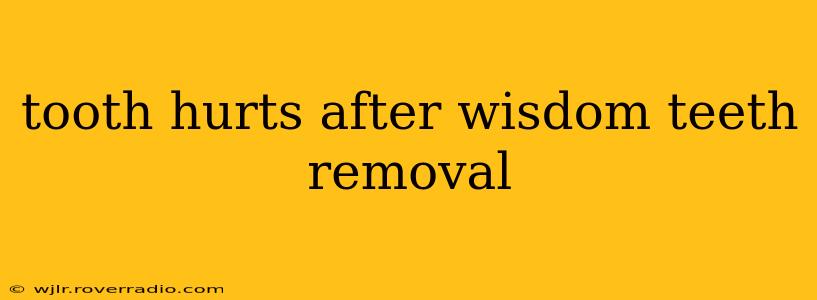Having your wisdom teeth removed is a common procedure, but the recovery process can be uncomfortable. Many people experience pain after wisdom teeth extraction, and understanding what's normal and when to seek professional help is crucial for a smooth recovery. This comprehensive guide addresses common concerns and provides valuable insights into managing post-operative pain.
What Causes Pain After Wisdom Teeth Removal?
The pain you feel after wisdom teeth removal stems from several factors:
- Surgical Trauma: The extraction process itself causes trauma to the gums and surrounding tissues. This trauma triggers inflammation and pain.
- Nerve Damage: In some cases, the nerves near the wisdom teeth might be slightly irritated during the extraction, leading to lingering pain or numbness. This usually resolves on its own.
- Dry Socket: A dry socket (alveolar osteitis) is a painful complication where the blood clot protecting the extraction site dislodges. This exposes the bone and nerve endings, causing intense, throbbing pain.
- Infection: Infection is a serious complication that can cause significant pain, swelling, and other symptoms.
How Long Does Pain After Wisdom Teeth Removal Last?
The duration of pain varies greatly depending on the complexity of the extraction, individual healing rates, and adherence to post-operative instructions. Most people experience the most intense pain in the first 24-48 hours, gradually decreasing in intensity over the following days and weeks. You might experience some discomfort for a week or two, but severe pain beyond a week warrants a check-up with your dentist or oral surgeon.
What Can I Do to Manage the Pain?
Managing post-operative pain is vital for a successful recovery. Here's a breakdown of effective strategies:
- Prescription Medication: Your oral surgeon likely prescribed pain medication. Follow the prescribed dosage and schedule meticulously.
- Over-the-Counter Pain Relief: Ibuprofen or acetaminophen can help manage mild to moderate pain, especially in conjunction with prescription medication. Always follow package instructions.
- Ice Packs: Applying ice packs to the affected area for 15-20 minutes at a time, several times a day, can help reduce swelling and pain.
- Rest: Adequate rest is crucial for healing. Avoid strenuous activities and get plenty of sleep.
- Saltwater Rinses: Gentle saltwater rinses can help keep the extraction site clean and promote healing. Avoid vigorous rinsing.
- Soft Food Diet: Stick to a soft food diet for at least the first week to avoid dislodging the blood clot.
Is it Normal to Have Pain in My Jaw After Wisdom Teeth Removal?
Yes, jaw pain is a common experience after wisdom teeth removal, especially if the extraction was complex or involved significant bone removal. The jaw muscles might be sore from the procedure itself, or from the swelling and inflammation. This pain usually subsides within a few days.
When Should I Call My Dentist or Oral Surgeon?
While some discomfort is expected, certain signs warrant immediate medical attention:
- Severe, persistent pain that doesn't respond to medication.
- Excessive bleeding.
- Signs of infection, such as fever, chills, or increased swelling.
- Difficulty breathing or swallowing.
- Numbness or tingling that persists beyond a few days.
How Can I Prevent Dry Socket?
Following your oral surgeon's post-operative instructions meticulously is crucial in preventing dry socket. This includes:
- Avoiding smoking.
- Not using a straw.
- Not spitting forcefully.
- Following the recommended diet and rinsing instructions.
By diligently following these guidelines, you can significantly reduce your risk of developing a dry socket and experience a smoother recovery.
Conclusion:
Post-operative pain after wisdom teeth removal is a common occurrence, but understanding the causes, management strategies, and warning signs can significantly improve your recovery experience. Remember to always contact your dental professional if you have concerns or experience severe or unusual symptoms. Your health and well-being are paramount throughout this process. A proactive approach and open communication with your dentist or oral surgeon ensure a successful and comfortable recovery.
